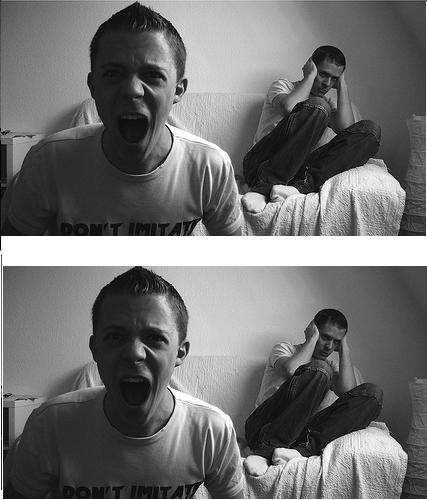
Chronic ulcerative colitis is a severe, prolonged inflammation of the colon or large bowel in which ulcers from in the walls of the colon, resulting in the passage of bloody stools mixed with pus and mucus. Diarrhea is common also in this condition, the true cause as yet unknown. some virus or bacteria may have obtained a foothold in the wall of the bowel and also may be greatly aggravated because of severe nervous strain and tension.
Scattered bleeding points appear on the inner surface of the bowel, followed by abscess that burrow between the layers in the wall of the colon. This causes the inner lining of the colon break down, resulting in hemorrhage, followed by more ulceration. all this gives a rough, cobblestone appearance to the lining of the bowel. at the same time, scar tissue in the colon reduce normal flexibility and interferes with the digestive process.
Chronic ulcerative colitis usually begins in the lower part of the bowel and spreads upward. The disease seems to attack young adults most frequently. The first sign of trouble may be increase urgency to move bowel, followed by cramping pains in the abdomen and bloody mucus in the stools. As the process extend upward, the stools become more loose and watery, so that the patient may have from ten to twenty loose bowel movements every day, often associated with abdominal cramps and rectal straining. The more severe cases often continue night and day with little relief. all this loss of blood and fluid from the bowel results in weakness, fever, nausea, vomiting, loss of appetite, and anemia.
When the disease occurs low down near the rectum the stools are more normal. But between bowel movements there are rectal discharge or mucus and some blood. Hemorrhoids are often present, as well as anal fissure, and fistulas. However, these complications are not presents in all cases.
Some patient with chronic ulcerative colitis also develop cancer in the irritated area. other complications included general weakness, loss of the weight, poor nutrition, abscess in the skin, and even cirrhosis of the liver. a thorough medical examination, including a sigmoidoscope study and X-ray of the upper and lower bowel, should always be made. most cases of ulceratives colitis are of long duration. at times the patient may feel fairly normal, only to be disappointed with the return of further trouble. a few cases seem to recover completely after the first attack, but this is not common.
Rest the bowel as much as possible. This will help to preserve the patient in a good state of nutrition so he can combat the disease. Strict bed rest with plenty of fluids and a high protein diet are very important in this condition. Food should be attractively prepared and the patient encourage to eat. The diet should contain at least 2500 calories a day, given three or four general meals. Patients who are very ill should be hospitalized and given necessary fluids by vein.
Many doctors give vitamin K tablets to increase the clotting power of the blood and thus help control the hemorrhage from the bowel. The combination of paregoric and tincture of belladonna will help to reduce the frequency of bowel movements and relieve the intestinal cramps. Sulfathalidine and sulfaguanadine tablets or Azulfidine tablets are often of value in helping to control the bacteria growth within the bowel, three tablets trice a day being the usual dose. Severely ill patient should also be given penicillin, but other antibiotics are not advised because they may irritate the bowel.
Many patient be have benefited from the use of ACTH and hydro cortisone. These will not cure the disease, but they may help to bring on a period of remission, during which the patient may greatly improved. Surgery may be needed in medical treatment fails. all the disease portion of the bowel should be removed, if at all possible, particularly if intestinal obstruction or malignancy develops. Surgery is also advisable in cases of sever, uncontrolled hemorrhage.
image source: [virtualmedicalcentre.com]